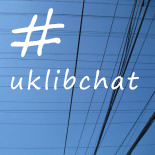 |
| Andy Tattersall |
There is the line that you can never have too much of good thing and these days there are so many good things that librarians and information professionals can employ in their working environment. The great thing is that since we emerged from the world of Web 1.0 to 2.0 that a lot of these newer tools are free and actually quite useful. The flipside is that a lot aren’t that good or just can’t be applied in a library setting, regardless of how hard you try and knock a square peg into a round hole, it won’t go (unless the square peg is smaller of course).
Libraries are no different from any kind of organisation, they have to use formally licensed software for the day to day running of their service. Even though this does not always mean the leanest or most dynamic of packages serving your library, but it does mean you will get a good level of service support and that is essential. The smaller, more niche tools have a part to play in this technology ecosystem - just like the microbes and bugs on Planet Earth - if we remove them the whole system would collapse. The larger technology companies often need the smaller companies to keep the environment from becoming stale and predictable. They also can eat them up from time to time, just like our bugs and other real world creatures. Take for example how - at the time independent company - Mendeley changed reference management dramatically for the better. The smaller technology companies are less likely to get bogged down by bloated platforms run by large companies who focus first on foremost in delivering a stable product for their users. Like I say, the stability of large platforms is essential, the flexibility and dynamic nature of smaller technologies is often where the real action is at.
 |
| uklibchat |
The last ten years has seen a tremendous growth in new technologies that can be applied in a library setting. The financial cost of these tools, such as Canva, Twitter, Adobe Spark and Eventbrite can be free. Yet with freedom can come a cost as problems can start to float to the surface, although not all of these problems are that worrisome. The old adage ‘If you are not paying for the product - you are the product’ certainly rings true with how some technologies will give you a free ride if you give them your data in return. There are also issues around what do you do when you become hooked into a useful platform, but want more from the premium add ons and the person holding the purse strings says no. How do you know whether the tool you are using will be here tomorrow - remember PageFlakes, Storify, Readability, Google Reader and Silk anyone?
Another question for the typical library or information professional is which tools are best and how can they be applied and which will work on their system - take for example a librarian in an NHS setting. The final and most crucial issue is around the investment of time used to master new tools and that can be problematic depending on the learning curve, but if you know how to use Microsoft Word you’ll probably master most lightweight tools in very little time. The sheer number of tools that can be used in the library sector is overwhelming, regardless of whether you are a public, NHS, business or academic librarian. One tool may solve a host of problems for one librarian but be as useful as a chocolate teapot for another. It is all about application and one of the greatest things to see in technology uptake in the library is how one person can use a tool and then another take that same tool and apply it in a totally unexpected way just as successfully. This is the wonderful thing about these technologies, whether it is Menitmeter for polling, Pocket for curating or Piktochart for posters, you you use it may be totally different from how someone else does.
Another question for the typical library or information professional is which tools are best and how can they be applied and which will work on their system - take for example a librarian in an NHS setting. The final and most crucial issue is around the investment of time used to master new tools and that can be problematic depending on the learning curve, but if you know how to use Microsoft Word you’ll probably master most lightweight tools in very little time. The sheer number of tools that can be used in the library sector is overwhelming, regardless of whether you are a public, NHS, business or academic librarian. One tool may solve a host of problems for one librarian but be as useful as a chocolate teapot for another. It is all about application and one of the greatest things to see in technology uptake in the library is how one person can use a tool and then another take that same tool and apply it in a totally unexpected way just as successfully. This is the wonderful thing about these technologies, whether it is Menitmeter for polling, Pocket for curating or Piktochart for posters, you you use it may be totally different from how someone else does.

1 comment:
Great Info About Gadgets, Thanks For Sharing
Upcoming Gadets
New Gadets In India
Gadets In Amazon
Post a Comment